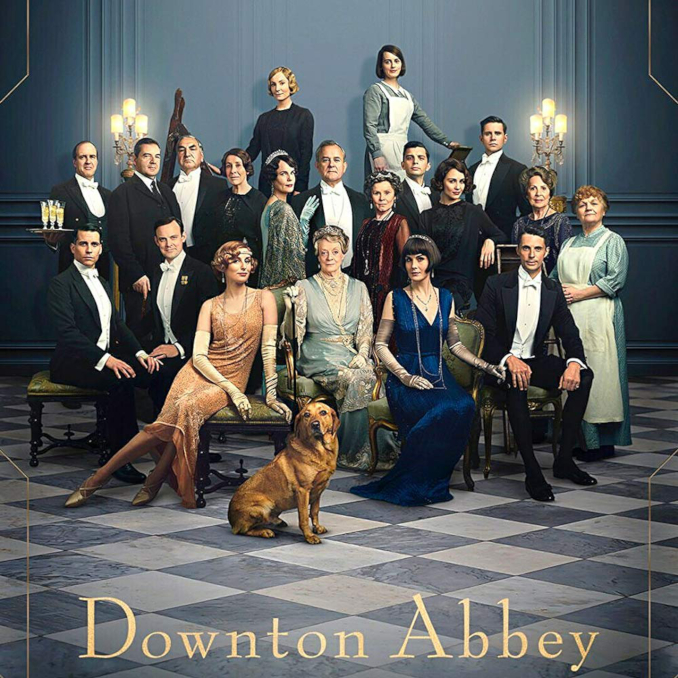Food for the Soul: From Downton to Wall Street

King George V: “Were you effected by the strikes?”
The Dowager Countess: “My maid was rather curt with me. She’s a communist at heart.”
From the movie Downton Abbey
By Nina Heyn – Your Culture Scout
Fall is good for fans of enjoyable dramas – summer superhero blockbusters have had their run, everyone is back at work and school, favorite TV shows are back, and we have not yet gone onto the Oscar mode of heavy dramas vying for accolades but causing a lot of stress when we watch them. This Fall, moviegoers can be split evenly – there is something for each type of a viewer. Fans of action can watch another installment of the Rambo saga- this one is called Rambo: Last Blood and it shows us the tired hero at his attempt first to have a family and then to avenge a brutal attack on his family with an equally unforgiving fight. Rambo’s audiences have aged together with the franchise so younger action fans may save themselves for Joker, the new, powerful (and controversial) take on the sinister Marvel character. The movie stars Joaquin Phoenix and Robert de Niro, and is touted as an Oscar contender but until the Awards season starts, there is some lighter fare to enjoy.
Downton Abbey needs little introduction, considering that the six seasons of the TV show that ran between 2011-2016 were watched by an estimated 120 million people worldwide. Perhaps so many viewers have flocked to this show because we all need some guilty pleasures-the same feeling we have choosing a sumptuous dessert after a month of dieting. Not very nutritious but so delicious.
If you are not familiar with the world of Downton, it comprises of the aristocratic Crawley family whose head, Lord Grantham, upholds the best values of the English landed gentry, and a large retinue of the family’s loyal servants. The TV show’s narrative started with the Titanic disaster that wiped out an heir to the estate, causing untold succession troubles, it had a dramatic arc of the WWI with both the footmen and a young heir being called to arms, and it ended in mid-1920’s. The movie version picks right up in 1927, where Downton Abbey is still a grand house in an idyllic park setting of Yorkshire lands that have been in this family for hundreds of years but the modern times are knocking on the door with Lord Grantham’s two sons-in-law running a car dealership, and the staff being kept at the minimum due to costs. However, both the family and their team downstairs have to pull all the stops to host King George V and Queen Mary during a royal visit. Historically, this royal pair did indeed tour English grand houses during their reign, and such royal visits were indeed a large honor and even larger expense for the hosting peers of the realm. Whether or not the servants were always so sunnily positive towards their employers (it is the 1920’s after all) is not certain. Downtown Abbey is a movie not a documentary so we can enjoy the incredible details of costumes, silverware and décor without questioning the plot too much.
The TV version brought to the fore a lot of issues: women’s emancipation, the brutality of modern warfare during the WWI, inheritance laws, social transformations. The movie has barely the time to introduce all the characters and it has even less room for social commentary, except perhaps the subplot of the hapless butler Thomas whose attempt at social freedom is fraught with real dangers.
However, the irresistible pull of both the show and the movie is the same – a few hours of pure escape into the times that will never come back, leaving just a faint trace in antique shops, old photos, or family heirlooms. Fans of DA, and there is a legion of them, can never get enough of immaculate gloves, lariat-length necklaces, men letting the women pass through the doors first, gleaming crystal, and impeccable manners that smooth out even the roughest moments.
Almost the entire cast of the show is back for the movie, led by Dame Maggie Smith whose wicked one-liners still spice every scene. Julian Fellowes, the show’s creator, and a legion of talented filmmakers had at their disposal a bigger budget and more time than the TV episodes allowed. They make a great use of this bigger palette – we have a splendid royal ball, many subplots including a military parade and a servant’s conspiracy to remove snooty palace staff from action, and acres and acres of beautiful locations. There is also plenty of humor, as evidenced by a priceless scene of Mosley the footman putting his foot in his mouth (pun intended). Here is how the director Michael Engler, explains this scene:
None of it relates directly to our daily experiences and therein lies the guilty pleasure. It’s like a horror movie for teenagers or an HGTV house hunting show for millennials – fun to watch but unlikely to be part of our real life.
If you are not into the sweet fantasy world of the bygone era of English lords, then on the opposite side of the spectrum there is the movie Hustlers– a tour-de-force performance of Jennifer Lopez as a New York strip dancer.
You cannot dip into reality more than that through this story based on a reportage about some strip club dancers who fleeced Wall Street wild boys in the aftermath of the 2008 crash. It starts like a female version of The Wolf of Wall Street – all the champagne and pole dancing, and then the mood gets somber when you realize what kind of life these women lead, gyrating every night in front of those drunk, smelly men with a hard on. Ramona (Lopez) and Destiny (Constance Wu) come up with a scheme to get their marks drunk and drugged, charge their credit cards to the max, and then send them back home. They correctly figure out that the victims would be reluctant to admit to their wives and their bosses what they spent the money on. Predictably, the hustle will eventually catch on with the women, but while the scheme is in full swing they are finally able to take care of their lives – pay debts, buy furniture, get stable homes for their kids, feel in control of their lives. This is what many women want but these “exotic dancers” have had a harder road upward than most. The movie has women both in front of camera and behind (it was directed by Lorene Scafaria on the basis of a magazine story written by Jessica Pressler) and it does make a difference in the tone of the movie. There is a lot of tears – first of frustration and humiliation, then of joy of success and sisterhood, and then of sadness and fear. There are plenty of scenes of regular private lives – doing homework with kids, taking care of family members.
Both movies have a common underlying theme – money.
In Downton Abbey, all these hats, jewels and gloves cannot mask the fact that the power of the English upper classes will soon be eroded by war and progress of technology, and servants in the mansion are as much a dying breed as the master’s ability to keep these mansions declines. The servants try to find other jobs or even steal to even the playing field. The masters have to marry off their heirs or find some new business to invest in – harvesting wheat on their rolling hills is not going to be enough.
In Hustlers, the NY strip club is as much affected by the 2008 banking crash as the financial offices on the Wall Street are (and it takes a bunch of women to save it – the club, not the Wall Street). Money makes the world go round (or not), regardless of the era and social class.
Check It Out!
